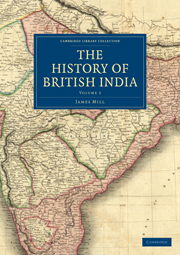Summary
Mr. hastings was nominated Governor-General by the new parliamentary authority; and General Clavering, Colonel Monson, Mr. Barwel, and Mr. Francis, the members of the new parliamentary council; not to be removed during the period assigned in the act, except by the King, upon representation made by the Court of Directors. Mr. Hastings had ascended with reputation through the several stages of the Company's service; had the rank of a member of council at the time of Mr. Vansittart's administration, and generally concurred in the measures which the party opposed to that Governor so violently condemned. After a visit to his native country, to which he returned at the same time with Vansittart, he was sent back to India, in 1769, to the station of second in council at Madras; and in the beginning of 1772 was raised to the highest station in the service of the Company, being appointed to succeed Mr. Cartier in the government of Bengal.
The sense which the Directors entertained of the vices which up to this time had stained their administration in India, is recorded thus: “We wish,” (these are the words of their letter to the President and Council at Fort William, dated the 7th of April, 1773,) “we could refute the observation, that almost every attempt made by us and our administrations at your Presidency, for the reforming of abuses, has rather increased them—and added to the miseries of the country we are anxious to protect and cherish.
- Type
- Chapter
- Information
- The History of British India , pp. 307 - 348Publisher: Cambridge University PressPrint publication year: 2010First published in: 1817



